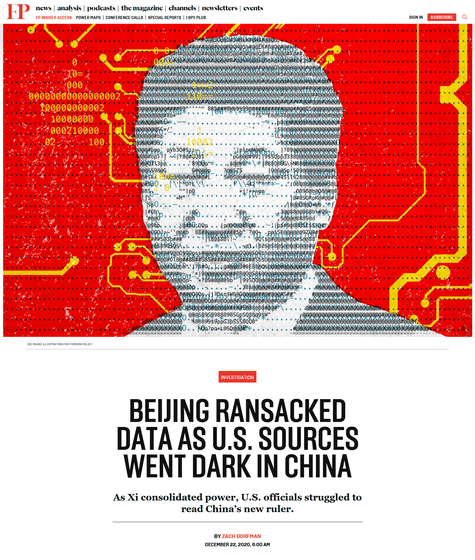Why has the United States been overtaken in the information warfare with China?

Beijing Ransacked Data as US Intelligence Sources Went Dark in Xi Jinping's China
https://foreignpolicy.com/2020/12/22/china-us-data-intelligence-cybersecurity-xi-jinping/

In early 2013, when President Xi was preparing to become President of China, he had no idea what kind of leader Xi was in the United States or Europe. The same year in January, Nick Christophe who was luxury daily newspaper New York Times veteran China correspondent, '習主seat is at the forefront of the revival of economic reform, probably would do even political relaxation' and am writing .
But in reality, even the US government knew little about the inside of China. In the 2000s, US intelligence agencies were actively working to get information about China, but it seems that US authorities are still uncertain about China's political situation in the last decade or so.
According to sources from a former U.S. national security officer, two Chinese operations, ' hacking into the Federal Personnel Administration (OPM)' and ' eradicating the CIA 's Chinese information network, ' are information about U.S. China. It had a great influence on the reconnaissance power. The information warfare between the United States and China in the 2000s is summarized in the following article.
What is the history of the information warfare with China, which former CIA and NSA officials talk about? --GIGAZINE

According to senior government officials during the Obama administration, White House officials at the time were discussing President Xi's personality and intentions and seeking new policies toward China. Within the Obama administration, there is a wide range of views on Mr. Xi, with the opinion that 'President Xi is also a leader who can improve some of the overkill parts of the Chinese system.' He is a new Maoist and a dangerous hardliner. '
Even within the CIA, opinions were divided on the rise of President Xi, but he was more skeptical than the White House about the view that President Xi was a dove. A former CIA official said, 'There was also wishful thinking that the rise of President Xi would drive some sort of ongoing reform in China, but within the CIA the Communist Party was to stay in power. Many people saw that they were aiming for centralization again, 'said the person.

by Thepeoplesartist / Wikimedia
'In Washington, there was concern about what President Xi would pursue, both in terms of domestic freedom and in terms of approaching the United States,' said Gale Helt, a former CIA analyst for China. 'The Chinese Communist Party is corrupt, to say the least, but there are signs that President Xi is trying to wipe it out, and we see a little light of hope,' he said.
But while U.S. officials are trying to figure out what's happening in China, China is more focused on hacking than ever before, strengthening digital defenses against US espionage from 2012 to 2014. .. In addition, it steals an unprecedented amount of data from the United States, sends more and more spies to sophisticated intelligence agencies, and the amount of information that China has can be said to have 'controlled the information warfare with the United States'. It is an order of magnitude.
For example,

In response to these moves, the United States has begun to take more aggressive steps through China's cyber-spying activities, and in 2014 prosecuted five hackers associated with the Chinese government. It is the first time that the United States has publicly prosecuted hackers belonging to other countries, and it is said that it also meant sanctions on the Chinese government.
However, behind the indictment, the Obama administration, which had the G-2 initiative , believed that 'this negotiation could open up mutual cooperation with the Chinese government.' President Obama wanted to make the visa acquisition process easier, extend the visa expiration date from one year to five to ten years, and promote tourism and educational exchanges between the United States and China.
'President Obama was keen to sign an agreement with China, and despite hundreds of meetings on the Chinese issue at the White House, the debate was a big deal,' said a senior CIA official. 'I didn't see it. All the intelligence agencies and FBI officials said,'The White House intends to increase the number of Chinese spies.''
The Obama administration was also thinking of signing an agreement with China on critical cybersecurity. In fact, President Obama announced that when President Xi first visited the United States in September 2015, he signed a bilateral agreement banning the theft of corporate secrets by hacking.

However, there are no penalties for violations of this bilateral agreement, and former Deputy Director of
After that, Mr. Dorfman said that the United States was finally forced to discuss 'the widespread vulnerabilities of the United States' due to the interference of the presidential election from Russia in 2016. Even after being attacked by Russia, the U.S. government is still worried that 'Chinese will use the U.S. data accumulated over many years as a weapon' and fears China more than Russia, which the U.S. government once hostile in the Cold War. It is shown that it is.

As a result, diplomacy with China became tougher at the end of the Obama administration. At that time, US intelligence agencies had pointed out that Chinese companies and the Chinese government were closely linked, and in 2016 the US government announced that it would closely monitor ZTE , a Chinese telecommunications terminal manufacturer. Then, the administration was transferred from President Obama to President Trump, and the US government tried to eliminate Chinese companies including Huawei and ZTE from the United States as an enemy of information warfare.
Related Posts:
in Note, Posted by log1i_yk






